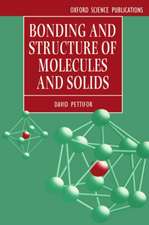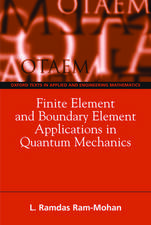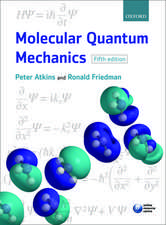Computer-Based Modeling of Novel Carbon Systems and Their Properties: Beyond Nanotubes: Carbon Materials: Chemistry and Physics, cartea 3
Editat de Luciano Colombo, Annalisa Fasolinoen Limba Engleză Paperback – 5 sep 2012
This volume provides the reader with a survey of state-of-the-art theoretical and computational contributions featuring novel carbon systems (excluding nanotubes). The chapters are authored by leading researchers who are all actively involved with different aspects of carbon structure and property elucidation. Consequently, a variety of methods are presented to the reader. The editors have successfully compiled an informative book that:
• Showcases the latest results in carbon materials
• Demonstrates how different theoretical methods are combined
• Explains how new carbon structures are predicted
Computer-Based Modeling of Novel Carbon Systems and Their Properties is aimed at advanced undergraduates, graduates, and researchers with an interest in computational nanomaterials.
| Toate formatele și edițiile | Preț | Express |
|---|---|---|
| Paperback (1) | 638.43 lei 6-8 săpt. | |
| SPRINGER NETHERLANDS – 5 sep 2012 | 638.43 lei 6-8 săpt. | |
| Hardback (1) | 643.34 lei 6-8 săpt. | |
| SPRINGER NETHERLANDS – iul 2010 | 643.34 lei 6-8 săpt. |
Preț: 638.43 lei
Preț vechi: 751.10 lei
-15% Nou
Puncte Express: 958
Preț estimativ în valută:
122.16€ • 127.89$ • 101.08£
122.16€ • 127.89$ • 101.08£
Carte tipărită la comandă
Livrare economică 05-19 aprilie
Preluare comenzi: 021 569.72.76
Specificații
ISBN-13: 9789400732544
ISBN-10: 9400732546
Pagini: 260
Ilustrații: VIII, 250 p.
Dimensiuni: 155 x 235 x 14 mm
Greutate: 0.36 kg
Ediția:2010
Editura: SPRINGER NETHERLANDS
Colecția Springer
Seria Carbon Materials: Chemistry and Physics
Locul publicării:Dordrecht, Netherlands
ISBN-10: 9400732546
Pagini: 260
Ilustrații: VIII, 250 p.
Dimensiuni: 155 x 235 x 14 mm
Greutate: 0.36 kg
Ediția:2010
Editura: SPRINGER NETHERLANDS
Colecția Springer
Seria Carbon Materials: Chemistry and Physics
Locul publicării:Dordrecht, Netherlands
Public țintă
ResearchCuprins
Liquid Carbon: Freezing Line and Structure Near Freezing.- Structure, Stability and Electronic Properties of Nanodiamonds.- Hexagon Preserving Carbon Nanofoams.- Simulations of the Structural and Chemical Properties of Nanoporous Carbon.- Amorphous Carbon and Related Materials.- Structural, Mechanical, and Superconducting Properties of Clathrates.- Exotic Carbon Phases: Structure and Properties.
Recenzii
From the reviews:
“A collection of separate studies, each looking at a different range of ‘novel carbon system’. … book will serve for many researchers as an excellent guide to what has already been done, and also highlights where there are still gaps. It will be equally at home on the desk of a starting PhD student as a more experienced researcher. I strongly recommend it for anyone with a general interest in materials physics, as well as the more focussed reader doing computer-based modelling of carbon-based materials.” (Matt Probert, Contemporary Physics, June, 2013)
“A collection of separate studies, each looking at a different range of ‘novel carbon system’. … book will serve for many researchers as an excellent guide to what has already been done, and also highlights where there are still gaps. It will be equally at home on the desk of a starting PhD student as a more experienced researcher. I strongly recommend it for anyone with a general interest in materials physics, as well as the more focussed reader doing computer-based modelling of carbon-based materials.” (Matt Probert, Contemporary Physics, June, 2013)
Textul de pe ultima copertă
During the last twenty years, the multiplicity of potential carbon structures has consistently posed a formidable challenge to theoretical and computational physicists. Several different methods are currently being used to study the structure and the properties of such systems. These methods include simulations based on empirical potentials, tight-binding calculations and density functional theory (DFT). A combination of these methods is needed to make significant progress in the carbon field.
This volume provides the reader with a survey of state-of-the-art theoretical and computational contributions featuring novel carbon systems (excluding nanotubes). The chapters are authored by leading researchers who are all actively involved with different aspects of carbon structure and property elucidation. Consequently, a variety of methods are presented to the reader. The editors have successfully compiled an informative book that:
showcases the latest results in carbon materials demonstrates how different theoretical methods are combined explains how new carbon structures are predicted Computer-Based Modeling of Novel Carbon Systems and Their Properties is aimed at advanced undergraduates, graduates, and researchers with an interest in computational nanomaterials.
This volume provides the reader with a survey of state-of-the-art theoretical and computational contributions featuring novel carbon systems (excluding nanotubes). The chapters are authored by leading researchers who are all actively involved with different aspects of carbon structure and property elucidation. Consequently, a variety of methods are presented to the reader. The editors have successfully compiled an informative book that:
Caracteristici
Presents a unique survey of the theoretical modeling of all phases of carbon Explores the computational challenges posed by the complex bonding in carbon Reports the recent and controversial theories e.g. the occurrence of magnetism Provides a basis towards a unified theoretical description of carbon Valuable for the whole community of computational condensed matter physicists Includes supplementary material: sn.pub/extras



















